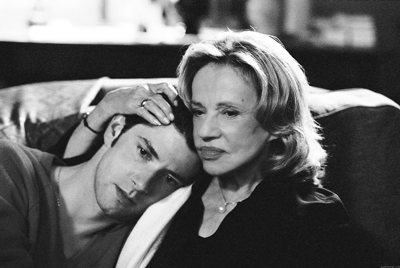Birds, bees, and even gays do it
Nine films into his career, it’s still a little hard to figure out French director François Ozon’s personality. Much of his work riffs on his favorite directors—his last film, “5x 2,” was a takeoff on Ingmar Bergman’s “Scenes From a Marriage,” told in backwards order. Although he’s credited melodramatist Douglas Sirk with the inspiration for “Time to Leave,” it doesn’t recall any individual film so much as a whole sub-genre about beautiful young people with terminal illnesses. In cinema, cancer is usually a sure cure for being a selfish jerk, a cliché “The Onion” once parodied with a story headlined “Loved Ones Recall Local Man’s Cowardly Battle with Cancer.” At times, Ozon has dabbled in the role of provocateur, but he plays “Time to Leave” disappointingly straight.
Photographer Romain (Melvil Poupaud) lives with his boyfriend Sasha (Christian Sengewald) in Paris. One day, he learns that he’s dying of cancer. The tumors have spread to several organs. While his doctor urges him to try chemotherapy, he also tells Romain that he has less than a five percent chance of recovery. Foregoing medical treatment, Romain decides to live out his last days as he pleases. At a stormy family dinner, he insults his sister Sophie (Louise-Anne Hippeau) and goes on to buy drugs while his father (Daniel Duval) waits in the car. He and Sasha break up. He goes on the road, visiting his grandmother Laura (Jeanne Moreau), with whom he has a strong bond, and meeting Jany (Valeria Bruni-Tedeschi), a married woman with an infertile husband who wants him to impregnate her. Laura is the only family member whom Romain tells about his impending death.
“Time to Leave” is the second part of an Ozon trilogy about mortality. The series began with his 2001 masterpiece, “Under the Sand,” and will conclude with a film about a child’s death. Ozon has frequently returned to the ocean—after all, his 1997 breakthough was called “See the Sea.” However, he’s usually used beach imagery with some irony. The protagonist of “See the Sea” endures her vacation, rather than enjoying it, and her loneliness leads to a vulnerability that proves lethal. In “Under the Sand,” the beach is the sight of a disappearance—and probable death—that makes a woman delusional. If the sea is associated with death in the final scenes of “Time to Leave,” it’s a far more peaceful sort than Ozon presented in “Under the Sand” and “See the Sea.”
“5×2” questioned whether the vow of monogamy implicit in most heterosexual marriages is workable. The subtext of “Time to Leave” is far more troubling. Like many troubled movie characters, Romain is repulsed by children but comes around to embrace them. As death creeps closer, he sees visions of a young doppelganger. Making the concept of an inner child literal is typical of this film’s missteps. While he initially rejects Jany’s offer, he eventually changes his mind, leading to a hot three-way between him, her and her husband. Even for gay men, “Time to Leave” suggests that procreation is a must, imagining no other way to leave a lasting legacy or continue the cycle of life. Romain’s fashion photography is not art with real value, just a sign of the shallow trendiness that cancer will allow him to transcend.
Melodrama has attracted gay directors as different as Ozon, Todd Haynes, and Stanley Kwan. Ozon is too knowing not to be aware of its pitfalls—or the pointlessness of camping it up or parodying it—but he still falls prey to it. Poupaud looks like a fashion model throughout—one can only conclude that he passed up chemotherapy because it would ruin his looks. As critic Jim Ridley wrote, “‘Time to Leave’ remains the kind of movie that evokes imminent death by having the hero wear shades and not shave.” When he gets sicker, he shaves his head, but his vanity remains. Ozon’s only real twist on melodrama is making its lead character gay. Compared to the imaginative vision of “Under the Sand” or Portugese director Joao Pedro Rodrigues’ delirious “Two Drifters,” “Time to Leave” may as well be a remake of “Love Story.”
gaycitynews.com



































